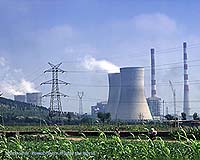| . |  |
. |
New York (UPI) Sep 22, 2009 As the U.N. summit on climate change was set to open today in New York -- the largest gathering of world leaders on the issue -- India and China were still standing firm against setting binding targets on emissions. U.N. Secretary-General Ban Ki-moon has characterized the summit as "the defining challenge of our time." It leads up to the December climate change conference in Copenhagen, Denmark, where countries are set to wrap up talks on a new emissions agreement to replace the Kyoto Protocol, which expires in 2012. India has said it is ready to play an "active" role in crafting a new global accord on combating climate change. While Indian Environment Minister Jairam Ramesh admits a "nuanced shift" in his country's position regarding domestic binding targets, he maintains that there has been no shift in India's negotiating stand, the India Times reports today. "The stand remains the same. We are not going to accept any legally binding commitments on carbon emissions," he said. At last week's Major Economies Forum in Washington, Ramesh was informally asked why India still rejects internationally binding emission targets if it is planning binding domestic legislation, the India Times reports. Ramesh expressed optimism prior to the opening of the summit on some areas of consensus, including finding ways for wealthy countries to obtain emissions credits by financing the protection of forests in poorer nations and the Clean Development Mechanism, which is a framework for promoting investments that reduce developing country emissions, The New York Times reports. Ramesh said India is preparing legislation to set domestic targets for emissions from power plants, agriculture, buildings, transportation and heavy industry, the Times reports. "India is going to aggressively take on voluntary mitigation outcomes and we are now going to go for domestic legislation which will enshrine some targets," Ramesh said, Press Trust reported Tuesday. The targets include a mandatory fuel efficiency cap effective in 2011, an energy efficient building code for 2012 and an increase in electricity from renewable sources to 20 percent by 2020. As for China, it "takes the threat of climate change very seriously and fully recognizes the urgency to take actions," said Su Wei, one of the country's top negotiators on climate, The New York Times reports. Wei called for developed countries to commit to greater emission reductions. Secondly, Wei said, developed countries need to provide the financing, technology transfer and capacity building to support developing countries to adequately address the challenge of climate change. Share This Article With Planet Earth
Related Links Climate Science News - Modeling, Mitigation Adaptation
 China pledges to curb emission growth by 'notable margin'
China pledges to curb emission growth by 'notable margin'United Nations (AFP) Sept 22, 2009 Chinese President Hu Jintao on Tuesday pledged to curb the growth of China's carbon dioxide emissions by a "notable margin" by 2020 from their 2005 levels. But Hu also did not put a figure on the cuts, telling the UN General Assembly that the curbs would be measured by unit of Gross Domestic Product, in line with China's concerns about preserving its rapid economic growth. "We will ... read more |
|
| The content herein, unless otherwise known to be public domain, are Copyright 1995-2009 - SpaceDaily. AFP and UPI Wire Stories are copyright Agence France-Presse and United Press International. ESA Portal Reports are copyright European Space Agency. All NASA sourced material is public domain. Additional copyrights may apply in whole or part to other bona fide parties. Advertising does not imply endorsement,agreement or approval of any opinions, statements or information provided by SpaceDaily on any Web page published or hosted by SpaceDaily. Privacy Statement |